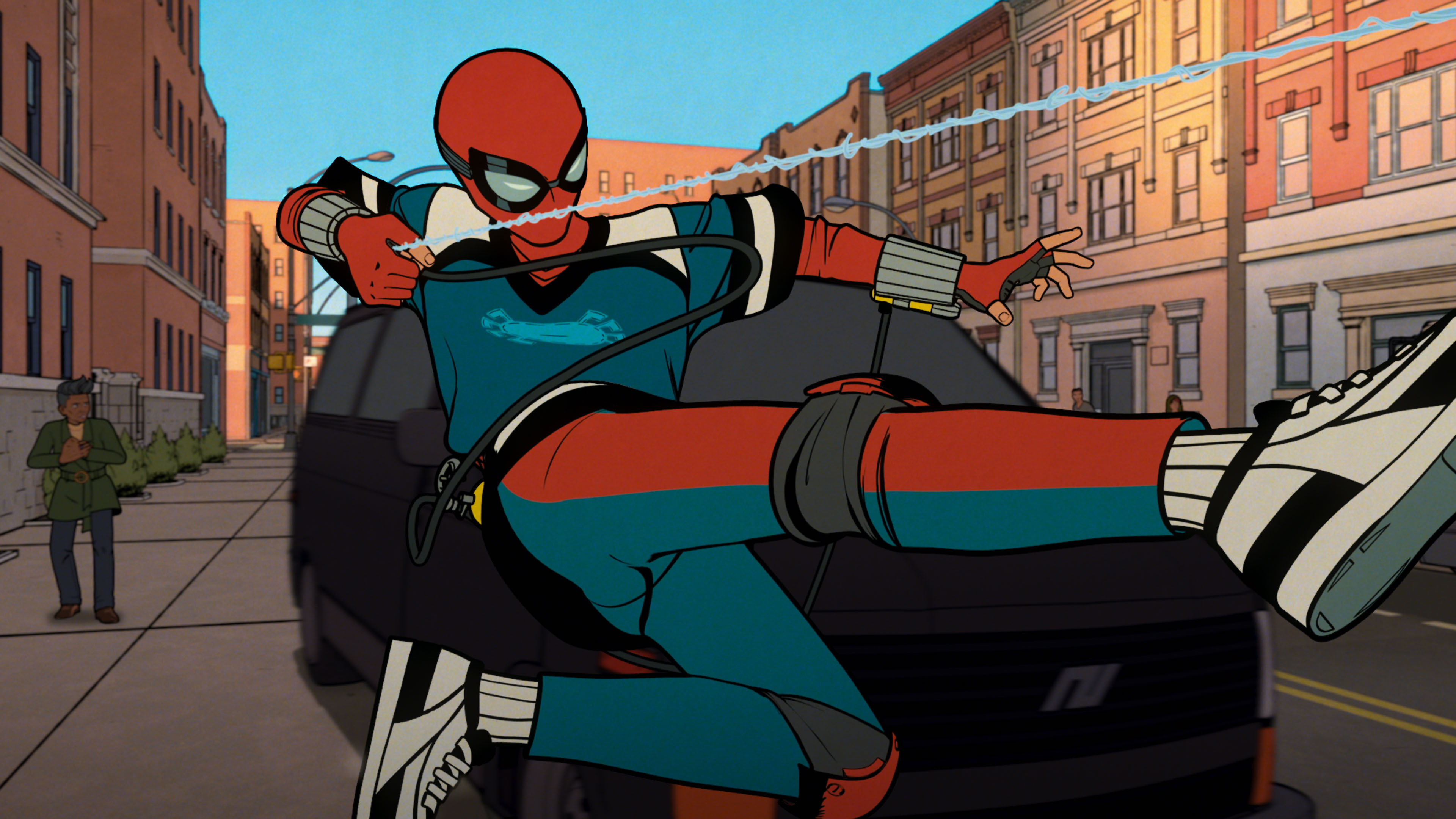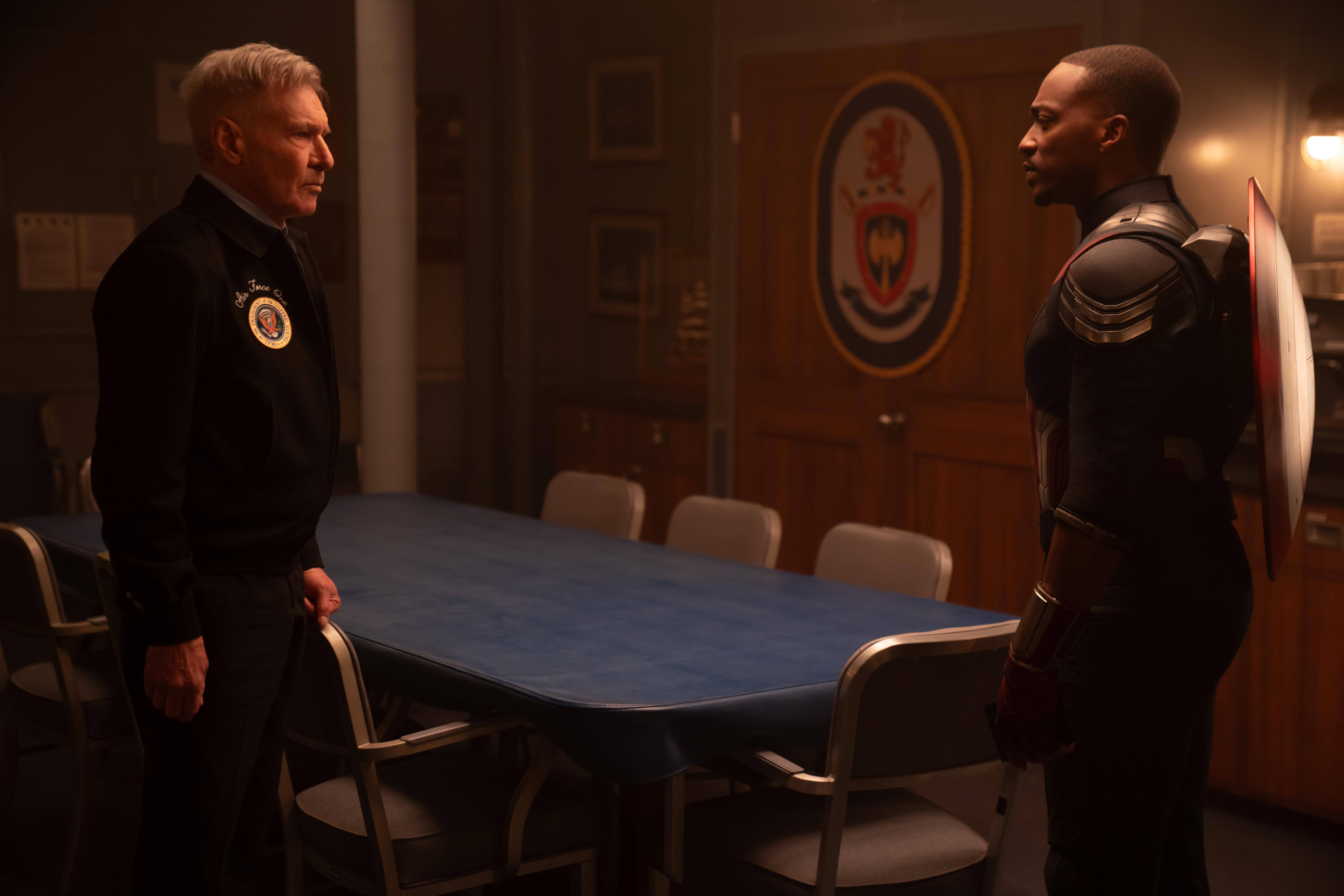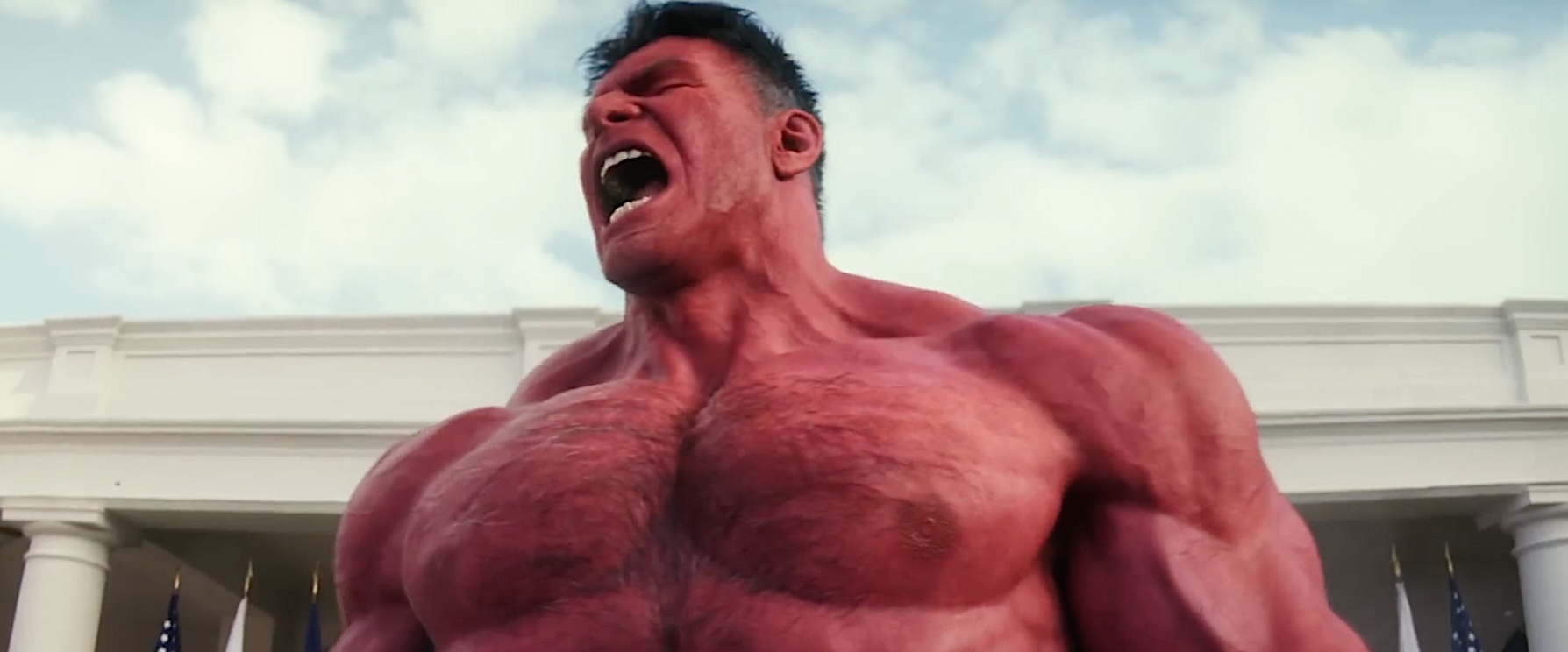There’s a conversation that crops up around Scott Pilgrim — the dude, the comic, and the movie named after him — far too often to go unaddressed: Scott Pilgrim is dating a high schooler.
This is quite literally the text; it’s the first line of the movie, the first panel of the comic book, and mostly framed in the same way each time: Scott Pilgrim is kind of a loser. Still, as these things do, from time to time the Discourse™ crops up, and people squirm under the uncomfortable discussion introduced by generally well-liked Scott Pilgrim being a bit of a turd. Like Doctor Manhattan, we experience this loop over and over again, as people relitigate the issue that’s really supposed to be a clear indicator that Scott has made some very questionable decisions.
[Ed. note: We’re getting into light spoilers beyond the first episode of Scott Pilgrim Takes Off. You’ve been warned if you want to watch first!]
Netflix’s new anime Scott Pilgrim Takes Off, written by original comic scribe Bryan Lee O’Malley and BenDavid Grabinski, makes its point on this matter even clearer. When Lucas Lee (Chris Evans), now playing Scott Pilgrim in a movie, hears his character is dating a high schooler, even the “quintessential Hollywood bad boy” is skeeved out. “I’d never do anything that stupid. If I did, my career would be over.”
Takes Off is very aware of what two decades worth of fans have said about its titular guy. And now it’s decided to do something totally different with all those thoughts. If Scott Pilgrim the comic was the original song, and the Scott Pilgrim vs. the World movie was the radio edit, then Scott Pilgrim Takes Off is a full-on remix. We’re talking Beyoncé’s “Savage” remix, or Elton John joining forces with Dua Lipa. Hell, you could even point to “All Along the Watchtower,” a cover that totally changes the nature of the song itself. Because Netflix’s show makes one very crucial change to make its title literal, rearranging the story completely while getting at the heart of the themes it was always about. In Takes Off, Scott Pilgrim isn’t the main character anymore. And everyone’s lives are better for it.
:no_upscale()/cdn.vox-cdn.com/uploads/chorus_asset/file/24120712/0915.jpg)
:no_upscale()/cdn.vox-cdn.com/uploads/chorus_asset/file/24853774/Scott_Pilgrim_Takes_Off_u_S1_E1_00_06_32_03.jpg)
Ramona Flowers (Mary Elizabeth Winstead) has always been a lot of things in the Scott Pilgrim story: She was Scott’s girlfriend, his dream girl, a relatively grownup presence in his otherwise childish life, a roller-skating delivery person, that one girl with hair like this. But while she was never a manic pixie dream girl for Scott (Michael Cera), she also wasn’t always a full person either, especially in the movie. By nature of the story, Ramona is the chase personified — to Scott, or to the exes battling her new boyfriend for another shot with her. The story is about how she’s indelibly cool. But it’s pointedly not about her. It’s Scott’s story, and everyone falls in line. Scott Pilgrim Takes Off takes Scott out of the equation, and uses that space to build out the colorful cast of characters.
With Scott gone, Ramona settles into his loss — until she figures out he’s missing, not dead, and sets out to figure out which of her evil exes abducted Scott. With her search, the Netflix anime has room to become something totally different than either of the story’s previous iterations. Over and over, Takes Off allows Ramona to literally reintroduce herself. Sure she’s that girl with the hair, but she’s also “the girl that got Scott killed, right?” By the time she quietly states her last name to a security guard midway through the season, it feels like the show is acknowledging how novel it is that she has to introduce herself at all. Ramona Flowers — as a cool girl archetype and a literal vision — is deeply ingrained in the DNA of what Scott Pilgrim is as a story. And now she gets to be something new.
Through Ramona, the ballsy and effective gambit of Scott Pilgrim Takes Off snaps into place. Sure, it kinda whomps that we don’t get a fresh version of the deeper story she always had in the comics. But with her chasing Scott rather than the other way around, it becomes a completely different kind of story that can do different things. We get new sides, new shades, and new possibilities for every character. The hunt for Scott takes Ramona to all her exes, leading to a more nuanced and thoughtful glimpse of who they are and how they actually have lives outside of the Evil Ex thing (which, as many of them state, was more like a social club than anything else). Where the comic ends with Scott earning the Power of Understanding, the anime provides Ramona the same opportunity.
:no_upscale()/cdn.vox-cdn.com/uploads/chorus_asset/file/25092102/Scott_Pilgrim_Takes_Off_u_S1_E1_00_11_33_14.jpg)
:no_upscale()/cdn.vox-cdn.com/uploads/chorus_asset/file/25092106/Scott_Pilgrim_Takes_Off_u_S1_E6_00_10_33_22b.png)
:no_upscale()/cdn.vox-cdn.com/uploads/chorus_asset/file/25092091/Scott_Pilgrim_Takes_Off_MainTrailer_03.jpg)
:no_upscale()/cdn.vox-cdn.com/uploads/chorus_asset/file/25092096/Scott_Pilgrim_Takes_Off_u_S1_E3_00_12_56_05.jpg)
Takes Off isn’t trying to erase history. It’s aware of the parts of the story that have trickled down through pop culture, but it sidesteps them with affectionate nods without retreading the same ground. Over and over again, it invokes touchpoints from the original story only to rework them: The crowd sings the Metric song (which still rules) Envy performed in the movie. When Scott and Ramona first meet, he makes a winking reference to some guy playing Sonic in two adaptations. Bread still might make you fat! But without Scott as the designated hero, that same fun remixing of the source material applies to the players of his little life. Young Neil (Johnny Simmons), Wallace (Kiernan Culkin), and the rest get nods to who they were before Takes Off mixes their circumstances up entirely, and the room to grow with this new version of events. In Takes Off, everyone gets to be more than an accessory to Scott’s story.
Without needing to have an antagonizing force for Scott, they get to be themselves in the world. Roxie (Mae Whitman) is just as hyper aggressive as she always was, while Matthew Patel (Satya Bhabha) is still short-tempered. But this time, their stories also get to be bigger than those traits — even upending expectations about the characters entirely. We get more on Ramona’s journey, but also Knives’ (Ellen Wong) self-actualizing in Scott’s absence. Turns out she, the aforementioned high schooler, just needed some time — and distance from the skeevy guy in his 20s “dating” her — to figure out her interests outside of Scott.
Knives’ journey feels representative of the promise, and ultimately the delivery, of Scott Pilgrim Takes Off: Being younger than most of her friends, Knives is more malleable to the influences of those around her. With a feature-film runtime, she gets short-shrifted, and exists as more of a punchline whose world revolves around loving Scott and hating Ramona. Here, even with plenty of other characters sharing the stage, she feels more whole. Her interests are still shaped by the time she spent with Scott, but she gets the chance to explore those interests on her own and find her own brand of self-expression. That’s the beauty of Scott Pilgrim Takes Off: It’s a show where things are different, but the heart of the original story and the characters that live in it are still true.
[Ed. note: OK no seriously we’re getting to the end here — of this piece and of the anime’s story. Spoilers for the end of Scott Pilgrim Takes Off ahead.]
:no_upscale()/cdn.vox-cdn.com/uploads/chorus_asset/file/25092109/Scott_Pilgrim_Takes_Off_u_S1_E1_00_13_08_05.jpg)
Perhaps nothing underlines this point as well as the show’s antagonizing force: Scott himself. In episode 6, we find out a jaded Old Scott traveled through time to pluck Scott Pilgrim out of the narrative as we know it and convince him not to date Ramona (who Old Scott married and then separated from). Though in the final episode he takes his efforts even further — we’re talking full anime group brawl — it’s not until Future Ramona steps in that Scott Pilgrim (the franchise) is able to close the loop on all its ideas.
Future Ramona and Current Ramona fuse into a single Super Ramona, and chide Older Scott for trying to punch his way out of everything instead of working through what they had together. In the end, they both decide that (regular/young) Scott is worth the time, so long as he has the awareness that fighting can’t fix everything.
It is a remarkably mature, thoughtful, and revealing ending to a long journey and several different iterations of a similar story. Co-writers O’Malley and Grabinski clearly revel in finding unexpected turns of fortune for each of their characters. And reframing Scott’s position at the center of the narrative as one that can be interrogated, and as an explicit place to grow from, is a masterstroke. Scott Pilgrim Takes Off feels like the result of a creator that has been maturing alongside his work. He’s heard the things people say about it, and digested them. The Netflix series takes it as a given that you know the broad beats of the story, and uses that to build something new with them.
:no_upscale()/cdn.vox-cdn.com/uploads/chorus_asset/file/25089681/Scott_Pilgrim_Takes_Off_MainTrailer_02.jpg)
It’s not all smooth sailing. Early on, the animation style can feel a bit uncanny; these actors embodied their characters fully in live-action, but some slower editing and the tricky nature of voice-acting means there’s a palpable stiffness to some of those performances that were once so clearly playful. But before too long, you barely notice, because the animation, from celebrated Japanese studio Science Saru, is a huge asset to the show’s vibe. It’s used to inventive effect, setting the tone for the wild and imaginative world Scott Pilgrim has always had — where Kim could casually reference being “kidnapped by a rival school” or the paparazzi are ninjas who swarm around while their leader shouts “we have you surrounded, actor scum.” The fights get to be more ambitious and even more winking than either the movie or the comic, simply because the animation allows them to be. And thus, two Ramonas can merge to be a Super Ramona, and crack open the narrative in the process.
You could look at a story like Scott Pilgrim and see the ways in which it is trapped by design; Knives is still technically a side character in someone else’s story, Ramona doesn’t get a full resolution with all her exes, and Takes Off doesn’t do a tremendous job of showing why Ramona cares so much about Scott after just one date. But again: the facts of Scott Pilgrim always start with a schmuck. What Scott Pilgrim Takes Off does so well is remix every beat to make you better appreciate the very bassline keeping the whole thing grooving together. Scott Pilgrim — the dude, the comic, the movie named after him, and now the show that takes place in his absence — lets the nature of the characters fill in these gaps, like how Knives gets to call Scott out for treating her badly, or that not all of Ramona’s breakups are created equal.
This story was always supposed to be the beginning of Scott and Ramona’s love story, a foundation that promised two flawed people they could come together and figure their shit out. The fact that she has (literal) sparks with him is enough for the narrative to let her be interested and even a little wistful; the fact that he’s alive somewhere is enough for her to be on the hunt. It seems telling that when Future Ramona wanted to preserve the record for Scott with the best version of the story, she wrote what we know to be a script very much like the 2010 film. Ramona wasn’t thinking of herself, just the idealized version of how their story could be seen. And then, Scott Pilgrim Takes Off lets her make that decision for herself. Finally.








